When I was younger, I often felt self-conscious and socially awkward. In fact, one of the reasons I wanted to become a Behavioral Scientist was to be better socially.
If you often feel anxious and embarrassed, this guide is for you. It will give you the tools you need to be more relaxed in social settings, get out of your head and into the conversation.
This guide is for anyone who’s feeling overly self-aware, but examples are geared toward adults in work or at college.
Note: Sometimes, the underlying reason for self-consciousness is social anxiety. If this is the case for you, here’s our list of the best books on social anxiety.
Let’s get started!
1. Focus on someone or something
Self-consciousness comes from being overly concerned with how people see us. We worry that we won’t be seen as smart, attractive, or that others are judging us.
It can be exhausting, and with too little evidence to support the argument in either direction, we go straight to the most negative conclusion.
To get out of this pessimistic mindset, try shifting your attention to the people around you and your environment.
Focus not on what others think of you but on learning about the people you’re with. Make it a point to find out one thing about every person you meet. It could be their job, their major, or what they did on the weekend.
The objective is to get out of your head. Put that energy into the people around you rather than into feeding an inner dialogue that’s holding you back.
2. Question your inner critical voice
It’s easy to believe the negative voice inside our head is always right. But have you tried questioning it? You might find out that it has little to do with what’s real.
Check the evidence from your life:
Can you recall a time you did something that proves your inner critic wrong? For example, if your voice says, “I always mess up around people,” remind yourself of a time when you did just fine.
Ask yourself if what you are feeling is reasonable. Or, are you letting a perception you think others have of you, run the story in your head?
3. Know that people notice you less than you think
In an experiment, students were asked to wear an embarrassing t-shirt.
By the end of the day, the students who wore the shirts estimated that 46% of the class had noticed. When polled, only 23% of their mates actually had.[1] In other words, their embarrassing t-shirt was only half as noticeable as they had thought.
What feels mortifying to us is usually having little to no impact on others. People are caught up in their own thoughts and struggles, too busy to worry about ours. The best thing we can do is remind ourselves that no one cares as much as we do, and even our own filter is not a perfect lens.
4. Know that it’s OK to say some stupid things
I remember talking to a girl I was crushing on when I was in high school. She was talking about how her brother liked a band, and like a crazy person, I said, “Ya, I know.” Like somehow, I knew what group her brother liked. My crush looked at me strangely but kept going.
Did it make any difference to my crush? Not really. At this point, I can laugh about it, but at the time it felt humiliating.
Try turning the tables on the situation. Would you care if someone blurted out something silly? Or would it just pass you by without giving it extra thought? It’s better to talk freely even if you say something stupid every once in a while. The alternative is to always guard yourself, and that can make you come off as stiff and aloof.
5. Don’t try to fight your feelings
Emotions tend to cling harder when we fight them and weaken when we accept them.[2]
When you are anxious, and feeling uncomfortable in a social setting, what are you thinking about? How does thinking about that make you feel? Happy, sad, nervous, jealous? What’s your body doing when you’re in your head and feeling awkward at a party? Are you sweating, jumpy, yawning a lot (a reaction to nerves)?
Simply accept how you feel rather than trying to change it.
Now focus outward. Talk to someone. Ask them how they’re doing. What brings them to this party/event? Do they know anyone? Then check your head. How do you feel when you’re talking to someone? Do you get any less nervous as the conversation goes on? If you were blushing, has it subsided yet?
Practice going back and forth between your inner thoughts and how you feel when you are talking to others. See if you feel better when you’re in your head, listening to your internal dialogue, or when you’re spending your energy on others.
6. Focus on your positive traits
This isn’t “think happy thoughts, and you’ll be fine.” Instead, you want to base your self-worth on your real, positive qualities rather than cynical and questionable self-talk. This is what we know is true:
- You have talents and abilities that give you fundamental value.
- This combination of characteristics makes you unique and memorable.
- You are worth spending time with and knowing.
Try to list your concrete skills like your mathematical ability, you’re a good writer, you’re multilingual, you’re a great cook. Then there are your personality traits. You’re kind, honest, genuine, funny, enthusiastic, etc.
Even if you can’t make a full list today, write one positive quality down every day and then review the list every week. When you have a comprehensive list, read it every day. You’re training your mind to focus on what you do well and to be able to access it quickly.
7. Make sure you’re reading the situation right
Negative experiences can teach us to be on guard and defend ourselves from criticism and hurt. This can affect how we perceive the world and the people we encounter.
Those of us who are overly self-conscious might believe the world will judge us harshly because that is what we’ve experienced. However, as I’ve pointed out, people don’t care that much about how we act or what we say. Every new person you meet thinks of you as a blank slate.
When you’re in a scary social situation, ask yourself, “Is there a chance my past experience is affecting how I’m seeing this interaction? Is there another, more realistic way I can approach his conversation?”
Believe people will be friendly, and most of the time, they will be. If not, it says more about them than you.
8. See yourself as a social observer
People watching is fascinating, and it shows us how our basic humanity makes us all messy, foolish, and funny. Go to the mall, grab a coffee/tea, and watch people walk with their friends. Listen in as they sit beside you and talk, or as they chase their kids down the hall.
Now notice their body language, their tone of voice, and eavesdrop on what they’re saying. What we’re doing is training you to switch your focus from yourself to others and to think objectively about what you’re witnessing.
Are people relaxed or stilted? Is their posture good, or are they slouching? When they talk, are they quiet, or does the volume go up and down with excitement? The more we see others being their imperfect selves, the more we’ll realize this is what ‘normal’ looks like.
Go into this observer mode when you walk into a room of strangers. It can help you be less self-conscious.
9. Assume that people will like you
This one is about the mechanics of being seen as confident rather than inhibited or self-conscious. When we feel uncomfortable, it can make us talk softer, hug our bodies with our arms, and speak faster to get the words out and move the focus off us as soon as possible. It can make us seem aloof, and even if we don’t intend to, it makes us less approachable.
Be confident and friendly right off the bat. Walk up to people with a warm smile and present yourself. If you’re uncertain about the details, look at how likable, confident people do it and learn from them. Assuming people will like you is a self-fulfilling prophecy. Assuming they won’t is, too.
10. Ask about others to take the focus off you
It’s easier to focus on someone else other than ourselves. When you meet someone for the first time, ask them what they do for fun. What are their hobbies, or do they have any pets? Listen carefully, nod, and give them signs that you are enjoying their story. Then add anything relevant that applies from your life. Things like your pets – what kind are they, their name, breed…or your hobbies. At the end of the day, you want to have a balance between learning about them and sharing about yourself.
The goal is to learn about someone else because it’s hard to be self-conscious when you’re focused on getting to know another’s interests and stories.
11. Make internal progress checks, not comparisons
Jealousy is a miserable emotion. It makes you feel small and worthless and sucks the joy out of everything. It’s like anger directed at someone else, but you are the one who feels crappy.
Avoid both overexaggerating someone else’s talents or trying to find flaws in them to make yourself feel better. No one is perfect, and tearing them down when you feel envious just retains the focus on you because you are still comparing yourself to someone else.
Here’s a thought: What if we were OK with the fact that someone is more accomplished than us? When we accept this, it helps us see ourselves differently.
Our value then has nothing to do with how successful we are or how good we are at something. We want to go from “I like myself because I’m good at…” to “I like myself.” (Period.) This makes our self-acceptance unconditional.
How do we accept that others are more accomplished than us and be OK with that? First, let that fact sink in, and allow all your emotions of envy and sadness to come to you. Accept those emotions rather than fight them. Now, you no longer need to fear them. Afterward, you will be less prone to comparisons.
Here’s another way to do it:
Instead of thinking, “Well, at least I’m better than them when it comes to X.” Say, “I’m not good at everything, which is OK because my value isn’t based on my achievements. I have value because I am 100% myself”.
Let’s talk more about how to be more self-accepting…
12. Practice accepting yourself
Self-acceptance is one of the biggest steps we take towards achieving self-confidence.
According to Aaron Karmin, MA, LCPC, a psychotherapist in Chicago, Ill, a person “who accepts [themselves] unconditionally as a worthwhile human in spite of [their] faults and imperfections does not experience the stress of self-consciousness.”.[3]
Here are some things you can do to accept yourself:
- Decide how you are going to live your life. Will you let others define your personal image, your strengths, and your weaknesses? Try to move from blame, doubt, and shame to tolerance, acceptance, and trust.
- Make a list of all your good points.
- What do you do well?
- What are you proud of accomplishing?
- Whose lives have you made better?
- Connections you’ve made with others.
- Hardships you have overcome.
Review the list often, so you see your progress and acknowledge your gifts.
- Take an inventory of the people close to you.
- Are they good for you?
- Do they reinforce negative self-talk?
- Do they criticize or demean you?
Consider eliminating all the negative influences in your life.
- Surround yourself with a positive support group of people who celebrate you.
- Forgive yourself. If you made a mistake, realize you did your best with the information you had at the time, or you simply made a bad choice. But now you chose to move on and forgive yourself.
- Silence your inner critic. Just because it’s hard to hear doesn’t mean it’s right or 100% true. If you wouldn’t talk to someone else like you speak to yourself, why is it OK to do it to you? You’re human like everyone else. Treat yourself as well as you treat anyone else, if not better.
- Move on from your unrealized dreams. You can’t change the past. All you can do is move forward and continue to pursue your current goals.
- Help yourself see how you make others’ lives better. It’s harder to see yourself in a harsh light when you acknowledge all the good you do.
- Let it go – You can’t control everything. It’s not resignation. It’s a realization that your energy is better spent elsewhere instead of railing against the things you can’t change.
- Try to solve your problems one at a time. First, step outside your head where all the worry and self-doubt resides. Take a dispassionate look at what you need to do to move past each issue. You could even try imagining that the problems you’re facing are someone else’s (if that helps you get away from your internal thoughts). Ask yourself what advice you’d give them (yourself) to help?
- Practice Self-compassion – accept your flaws and love yourself anyway. Simple words, but for most of us, it takes years, if not a lifetime to master this step. The more you do it, the better you’ll get in every respect.
- Even though you may not have much experience being kind and compassionate with yourself, you will start to believe these good things you’re telling yourself. Especially if you keep this positive internal monologue up. In many instances, it took years to get to this place of insecurity. It will likely take weeks and months to see progress and make permanent changes to your mental habits.
13. Practice thinking about other’s needs
Try doing thoughtful things for others. Consider their struggles, worries, dreams or regrets. When you do, you take the focus off yourself and you’ll connect with them. This will help you be less self-conscious.[4] It will also show others that you are caring, and you value them. Done selflessly, it will bring good things back to you.
Here are some suggestions:
- Smiling at someone after you meet them. It could be a friend, family member, or acquaintance. Let the smile happen as you talk to them, so they know you are smiling just for them because it grows after you say, ‘Hi.’
- Hold a door for someone.
- Give a spontaneous compliment.
- Bring a friend or co-worker cookies or a pre-made dinner if they are sick or need a pick-me-up.
- Pay it forward. Pay for the coffee or drive-thru meal of the people behind you.
- Keep your area tidy and organized if you work in an open-concept office.
- Send cards for different occasions or for no occasion at all.
- Give someone 100% of your attention and note what they say so you can follow up later. (Ask them how ‘it’ went. Make sure they are OK afterward.)
- Consciously spend a few minutes every day thinking of the things you are grateful for.
A word of caution: Do not do these things to gain others’ approval. That puts the focus back on you. Do it out of sincere consideration for others. The purpose of the exercise is to focus on others and their well-being. When you do, you’ll become more compassionate and less self-conscious.
14. Consider talking to a Therapist
If your self-consciousness is inhibiting you or is a result of social anxiety, a therapist can be helpful. Having social anxiety is more common than we think, and deciding to understand and address the effect it has on your life is brave. A Psychologist or a Therapist will help you talk through your feelings, find out where they originate from, and give you the tools to unpack them and move forward.
We recommend BetterHelp for online therapy, since they offer unlimited messaging and a weekly session, and are cheaper than going to a therapist's office.
Their plans start at $64 per week. If you use this link, you get 20% off your first month at BetterHelp + a $50 coupon valid for any SocialSelf course: Click here to learn more about BetterHelp.
(To receive your $50 SocialSelf coupon, sign up with our link. Then, email BetterHelp’s order confirmation to us to receive your personal code. You can use this code for any of our courses.)
You can also try contacting your insurance company or doctor for recommendations.
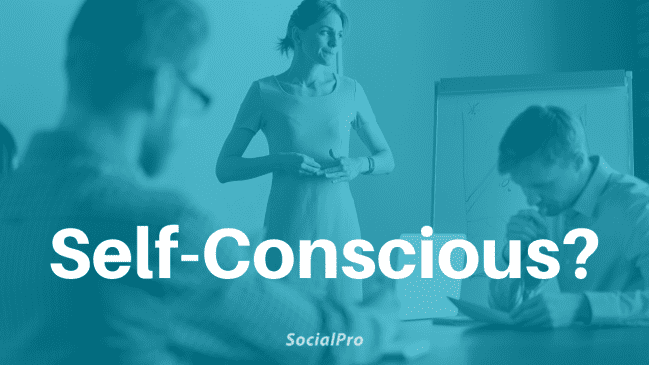





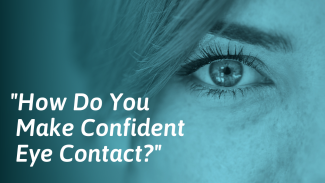
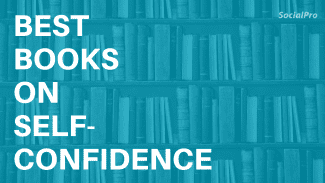
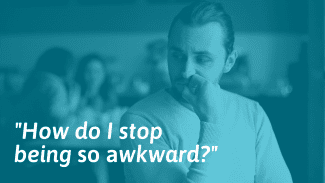

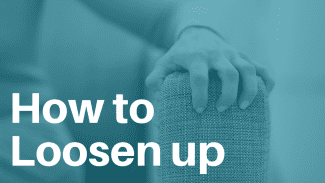
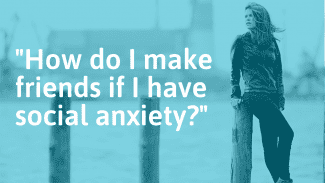
I stutter in conversations with people when I view them as socially more valuable than me. Sometimes it’s trying to impress a potential mate, or trying to talk to my boss, or even people in the same position as me at work who I feel are better than me at the job.
Not knowing enough or not at all; about current or past events.
Not, remembering someone’s name or where we met or what we talked about.
Stumbling or mispronouncing my words.
I tend to speak backwards. The last part of my sentence should of been said in the beginning. I think this comes from years of being self conscience. I turn red just thinking about a situation that happened or is about to happen.
I don’t know why I’m writing this , so anyhow , about talking backwards , there was too many times when I did that , and people don’t get it and understand the opposite , in example “I like tea then coffee” what I mean that I prefer coffee first but they understand that I mean that I prefer tea first , I guess I should organize my words before saying it and being slow to know what I’m saying , you agree ?
Its uncomfortable to feel judged by my color. To walk in a room as the only woman of color can be overwhelming.
My face, my hair, my teeth.
Honestly when someone has an entire story to share with me I never have anything to say that relates to the situation and end up just replying with a comment or two. I find that I don’t have anything interesting enough to share so I tend to stay quiet. I ask questions just too make it seem like I’m in a conversation.
Wow, I thought I was alone! I have very charismatic friends who have lived lives that one would love to experience. They’ve done it all. They have the best stories, always entertaining the crowd. And then there’s me, quiet old Johnny who lives in his friend’s shadow. When I’m alone, they always ask me about my friends, “ where is he?” “If he were here, we’d be having so much fun”. It breaks me everytime. I just don’t know how to have fun times with people. I feel like I’m just someone who happens to be there.
I’m afraid to sound boring.I never have funny memories to say or funny thing in general
I’m afraid to come across as dumb. Especially with people that intimidate me easily- such as very confident, honest and extrovert people. I very easily run out of things to say in a conversation because I overanalyze everything. I have a hard time keeping eye contact with a person for too long, because I feel intimidated. And, I am terrified of conflicts- every time someone has made me sad or angry, and I really want to tell the person how I feel, I always end up not doing it, because I am so afraid how the other person will react, and that I will stand dumbstruck and full of anxiety as I usually do.
Hi AG – i just noticed your comment about eye contact. One method i learnt that really works, is that if you look directly at their nose, they cannot tell! Honestly try it. It makes it so much less intimidating for you, without having to maintain constant direct eye contact, and they have no idea. win-win !
I get scared always from revealing any of my non important secrets from my important secrets list to avoid breaking up with for example my friends even when I feel that I am close enough to tell them these secrets some times these secrets are feelings towards them most probably +be but I gets scared from their reaction so I thinks of making one of my friends(boy) who is as close as i or more to that girl to give hints but i also get scared that he reveals what i asked him to do.
Im afraid of not knowing things i feel i would be expected to know in work situations. Saying i dont know doesnt feel like a valid answer sometimes with colleagues or customers.
I’ve been afraid of being rejected by others for being awkward or anxious in social situations ever since I started struggling with social anxiety.
I’m afraid of people thinking I’m a loser. I’m afriad of sharing my true opinions in case I get judged for them.
whenever i get out of hostel room or home i feel like everyone i come across at my way has something bad about me on his mind and he or she is judging me for that and then i try to to act like to show them i am not like this and this makes me more anxious and panic because at that moment i think they caught my weakness and then i try to escape the situation and even dont get the things done for which i was out of home .
There are so many sore spots in communication between people now. Everything seems to have an agenda. I feel very incompetent and judged for things I may say without any intention to slight or offend. I commented that I liked the color of a guys shirt, and was rebuffed with a downward glance. I guess that you should not comment on appearance due to defensiveness? It can produce. Women have have a harder time if they are correct weight and attractive. I am forever stuck talking about the weather only.
Dude this is somewhat me! I’m scared I might offend someone if I speak in acertaron way or if I don’t say “thank you” sincerely enough. Like yeah…..it sucks.
I know, there seems to be a ton of unspoken rules. I am afraid to break them and be judged for that.
I’m always afraid to do something that is socially unacceptable or do it the wrong way, and end up messing the whole thing up. I hate it when someone has to step in or say “no it’s okay, just leave it, I’ll take care of it”. I feel like I failed at such a simple task and whoever I’m with is judging me on it. It happens all the time. I feel like a loser
I’m afraid that I’m a joke to everyone and I just dont know it.
I know I’m a joke, I see them laughing and staring all the time. Why don’t they help me out? Show me instead of laughing at me…but then again, nobody wants to spend their time helping a loser, they have better things to do. They live interesting lives, why waste it with someone so stiff and boring?… they just couldn’t care less
I can relate to so many of what people have posted here. Sometimes you think you’re the only one feeling this way. I think people are judging me as being slow and not that smart. I try to talk and make friends but soon feel excluded. I cant think of the right words and become intimidated by people that speak really well.
I have tried sharing how I feel with people I work with. If I am nervous or anxious, I might make a joke to let them know how I feel. I try to help if someone else might be feeling nervous. I share my experience to set them at ease. I always praise them for their achievements so they feel empowered. However, I think this has made them judge me. Now, I get the impression that I am judged as weak or incompetent for admitting to my feelings. Maybe it would have been better to say nothing about my anxiety. It has made me angry that the people I trusted now treat me like a child. My hard work and achievements are not recognized. I am very good at my job, but I am still seen as less worthy because of my anxiety. I am not included in decisions which effect my work and I am never given a raise, even though my responsibilities are increased. When I try to talk about it, I am dismissed. It seems like I am a slave to those I work with. I am considering quitting my job and starting over. I won’t feel so confident about sharing my feelings or giving praise again. I thought I could relax and share more about myself at work as long as I performed well at my job, but it seems that it did not work for me. Now I am more anxious than ever.
I’m scared of being persieved as the “quiet girl” when its not that I’m quiet its just that I’m so in my head and anxious i cant concentrate and i panic in conversations .when I’m not comfortable with a person I feel so helpless too ,like I’m trying o talk to them in my mind but my body will to physically let me speak.im not self conscious or not confident i am in fact the opposite but i cat express these to others
I am afraid people will think am not smart enough so I hold back to any thought that I may have,,I also get very nervous speaking in front of a people whether I know them or I don’t .I also think people despise me because I am small person
I fear people finding out the ugly truth about me. I can’t sustain friendships and often have no friends. My confidence is so low I avoid people now, and rarely attend social events. I’m sure I look aloof and unapproachable. I’ve spent years perfecting this.
The sad truth is I’m lonely and afraid. So afraid I’m isolating myself so I don’t feel rejected.
I’m the same way!
I’m afraid of not having anything to say and making awkward silences which I always do and can’t get rid of it
I’m the same way! What can we do?
I’m afraid of like failing with something or just embarassing myself in front of an attractive girl, and if i’d do that i’d probably miss out on her.
I get caught in my own head with fears of not being smart enough if I engage in a conversation, at the same time I am overly concerned about what people think of me for how I like and how much money I make and when this is going on I cant find anything to say or think to say and it almost becomes a panic then I get scared that they think I am weird and introverted and it becomes a total melt down.
I am afraid people will reject or judge me harshly. I am worried think I am ugly and have a big nose. I am afraid people think worse things about me. I am afraid I will be ridiculed.
My worry is when I come into room that I will be judged for my awarkd body language.if someone there ask me who’s this how to respond without coming off backwards or unsure how to respond back to them any help from the group would be great
Being judged for my speech. I’m not the greatest speaker in the world & when I get around people I tend to stutter alittle bit. My mind goes blank often and I often force words out which makes it worse.
I feel the exact same way my head is always blank when it comes to people and talking to them
I feel the exact same way.
I also stutter when talking to people I perceive as superiors (even if there is no reason for me to think they’re superior). It’s embarrassing and I wonder if they noticed how I trip over my speech and relate it to me being nervous with them. It scares me because a bad person could really use it to hurt me.
I’m afraid of being rejected, left out. Judged. Being boring to people because I’m always trying to think what else to say since I always go blank while talking to others.
I Have the same feeling. I fear that ppl will think that I am too clingy
Worried about how to act if someone makes fun of you.you don’t feel good but how to respond..n thanks a lot for ur mail…it means a lot..thnks n keep sending pls
i am always afraid that the next is not judging me it really made me angry thinking about it i know people dont give a damn but still my mind working like this
As of lately, I’m afraid of looking like an aloof, stuck-up, and seedy asshole because I can’t look people in the eyes, don’t really say much, or don’t acknowledge certain people that I find intimidating.
I’m also afraid I’ll run out of gas in the middle of the social highway because my energy for it is just so finite.
I am afraid of people noticing how awkward I am and also being laughed at for the boring, weird life I have because I was teased a lot in most of high school and college.
I also faced the problem sometimes but you have to do follow the mantra..
You are what you think of yourself..
Not others